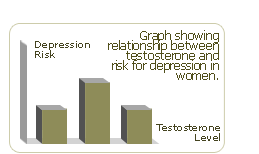34 MENOPAUSE SYMPTOMS |
HEALTH CENTER |
|
| |
|
|
|
Testosterone Possible Trigger for Depression |
Although testosterone is typically thought of as a male hormone, the hormone also plays an essential role in women's health. However, augmented levels of testosterone in women can result in serious physical and psychological conditions: a recent study suggests that even mildly elevated testosterone levels in women can result in depression and other mood disorders.
|
|
Just like estrogen, male hormones like testosterone (technically known as "androgens") have a significant influence on cognitive development. In utero, testosterone appears to influence the brain's formation and behavioral responses. The hormone also seems to have an impact on cognition well after infancy. Some medical researchers postulate that testosterone hormones may modify an adult brain's neurotransmitter receptors, which could cause the brain to react to stimuli in different ways, thus leading to mood disorders such as depression or anxiety.
Researchers have found evidence that androgens seem to be linked to mood disorders in women in a variety of cases: for instance, free testosterone levels tend to be higher in women who suffer from premenstrual syndrome (PMS) and depression. Elevated testosterone levels are also associated with postpartum depression, while women receiving testosterone as part of their hormone replacement therapy during menopause reported unusual aggressive feelings. |
|
A recent study led by Weiner et al explored the relationship of testosterone to mood by following 27 women with polycystic ovarian syndrome (PCOS), compared to 27 normal menstruating women. PCOS is a disorder of the endocrine system (the hormone-regulating system) that is defined in part by significantly elevated levels of free testosterone and decreased levels of estrogen and progesterone, which results in symptoms such as acne, increased body hair, and weight gain. PCOS is one of the most common causes of infertility in women. |
 |
|
27 women with PCOS were matched with 27 normally menstruating women according to body mass index (since being overweight, a common symptom of PCOS, can also be a factor in depression) and other demographic factors. Blood samples were taken at different points of the menstrual cycle to test for testosterone, estrogen and progesterone levels, and subjects were asked to fill out questionnaires to self-evaluate levels of anxiety, depression, anger, life events, eating disorders, self-image and acne (another possible factor in depression).
The study found that compared with women with normal levels of testosterone, women with higher testosterone levels reported symptoms of depression that were more persistent and more severe. Paradoxically, however, risk for depression increased only if testosterone levels were slightly above normal; extremely augmented androgen levels do not seem to have an affect on depression, anxiety or aggression. |
Weiner et al concluded that although the PCOS women could be at a higher risk for depression due to the symptoms of their disorder (such as acne, weight gain, and hirsutism, or increased body/facial hair), because the symptoms of depression and anxiety decreased with increased testosterone (and hence increased symptoms), one may conclude that this is a hormonal, and not a psychological effect.
The researchers found that there is a decided link between testosterone hormones and depression, anxiety, and other mood disorders. Even after factoring in PCOS symptoms that could also influence one's emotional state, elevated testosterone still seemed to be a major factor in depression in PCOS women.
By Natural-Progesterone-Estrogen-Supplements.com |
 |
|
|
|
|
| |
Copyright� 2008 - - All Rights Reserved |
|
|



